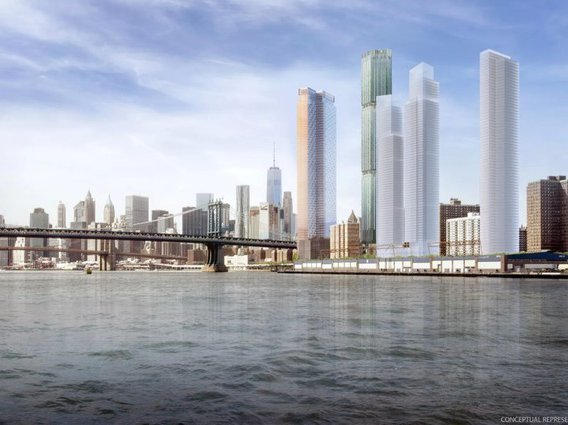Judge Sides With LES Groups In Fight Against High-Rise Towers In Two Bridges
Feb. 26, 2020, 2:57 p.m.
Community groups are using the latest rulings to push for efforts to rezone the neighborhood altogether.

The City Planning Commission's December 2018 approvals of four mostly-luxury towers in Two Bridges have been struck down by a state Supreme Court judge in two separate rulings this week. The rulings were hailed as a victory by various community groups, which have been fighting the proposal for years.
"They've hit a roadblock, and it's a pretty high one," Tenants United Fighting for the Lower East Side board member, Trever Holland, told Gothamist. "It's a great victory, and I'm happy [and] surprised. But we still have some work to do if we're really going to protect this neighborhood."
Lower East Side Organized Neighbors' [LESON] member Tony Quey Lin, a plaintiff in a separate community group lawsuit, said in a statement, "This is an amazing victory and it comes on the tails of victories across the city."
The rulings, which developers say they plan to appeal, concluded the planning commission must determine how the towers would impact the neighborhood under a zoning rule (ZR 78-313) before granting approvals to the towers. The two separate lawsuits—led by TUFF-LES and LESON—build on a third ruling last summer that found the project must be approved through the uniform land use review procedure. That process ends with a City Council vote.
A spokesperson for the developers, JDS Development Group, L+M Development Partners, CIM Group, and Starrett Development, said in a statement: "We of course disagree with the court's rulings, as these projects were lawfully approved, met all requirements, and are in compliance with zoning that's been in place for more than 30 years."
The four separate towers, two of which would share a base, were expected to range between about 63 and 80 stories. Three-fourths of the more than 2,700 apartments would have been market rate, though the spokesperson emphasized the hundreds of "affordable" apartments the towers would include.
"Together, they will deliver one of the largest single infusions of new affordable housing to Manhattan in decades, at a time when the creation of all types of housing is critical to slowing rent growth citywide," the developer spokesperson continued. "The projects were proposed after years of community consultation and environmental analysis, and would include investments of $40 million in upgrades to the East Broadway subway station that will make it ADA-accessible for the first time, $12.5 million in essential repairs to the nearby NYCHA complex and $15 million in upgrades to three public parks in the neighborhood. We will appeal these rulings in the near future."
Law Department spokesperson Nick Paolucci said the city is "evaluating next steps including whether to appeal."
Community groups saw the judge's rulings as momentum for efforts rezone the neighborhood altogether—requiring new developments to have more deeply affordable housing and setting height restrictions on future buildings.
"The dynamic is shifting in the city," said Elyse Highstreet, a community organizer with Good Ol' Lower East Side [GOLES]. "I think [the rulings] really just shows the power that communities have."
GOLES, TUFF-LES, and other groups have been working on a rezoning application to submit to the Department of City Planning since 2018 to rezone the Two Bridges waterfront.
Though it hasn't been certified for public review, Highstreet said, "The court case helps push that because it shows that these developments aren't warranted for this neighborhood in particular." (A Department of City Planning spokesperson said staffers have had discussions on technical guidance with the groups.)
The groups' lawyer Paula Segal said the ruling "simplifies" the environmental review process, since it allows the Two Bridges Community Plan to be written with the implication the towers won't be built.
"We're no longer talking about a developer's fantasy world," said Segal, a senior staff attorney with TakeRoot Justice.
The Two Bridges community-led rezoning plan—which is in stark contrast to a rezoning push in Morningside Heights that has City Council's backing—builds on years of meetings for a broader effort to rezone Chinatown and the Lower East Side, known as the Chinatown Working Group rezoning plan.
Lower East Side Organized Neighbors, Chinese Staff & Workers Association, and others behind the separate community group lawsuit are still pushing for support for the broader working group plan, rather than Two Bridges alone. Lin said they have 5,000 signatures in support of the Chinatown working group plan.